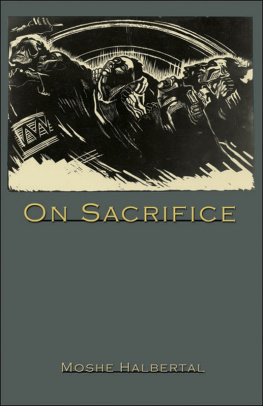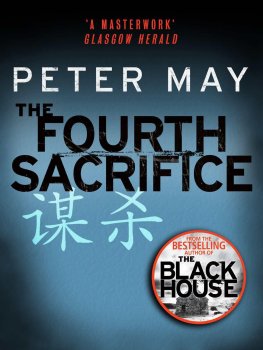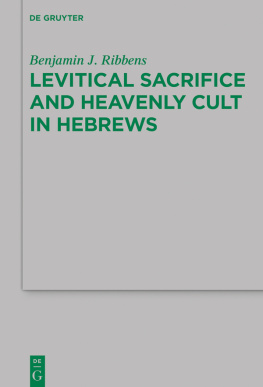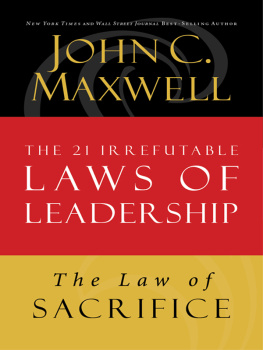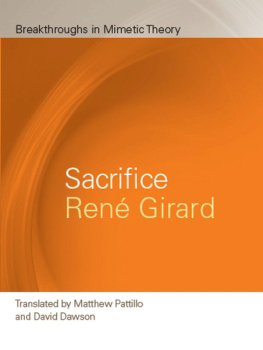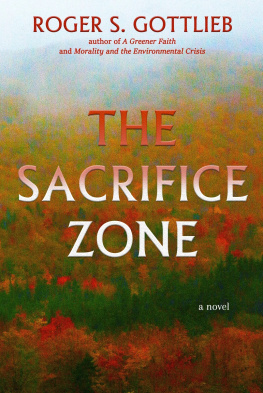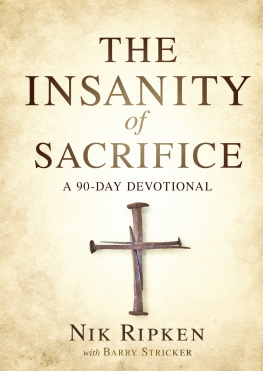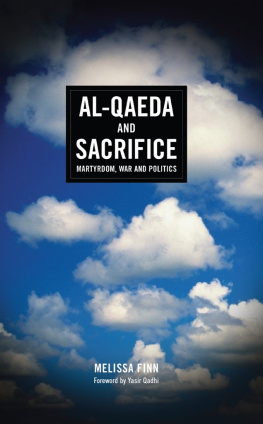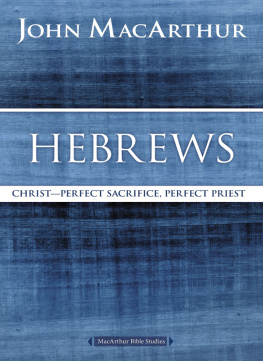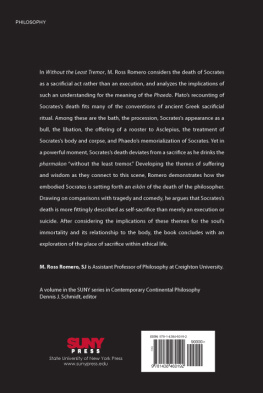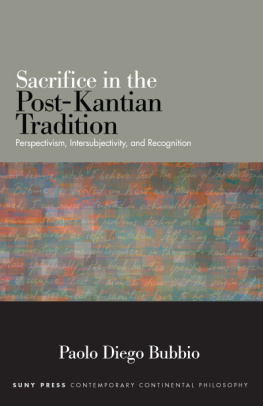On Sacrifice

On Sacrifice

Moshe Halbertal
Princeton University Press
Princeton and Oxford
Copyright 2012 by Princeton University Press
Published by Princeton University Press, 41 William Street,
Princeton, New Jersey 08540
In the United Kingdom: Princeton University Press, 6 Oxford Street,
Woodstock, Oxfordshire OX20 1TW
press.princeton.edu
All Rights Reserved
Library of Congress Cataloging-in-Publication
Halbertal, Moshe.
On sacrifice / Moshe Halbertazl.
p. cm.
Includes biographical references (p. ) and index.
ISBN 978-0-691-15285-1 (hardcover)
1. Sacrifice. 2. Self-sacrifice. I. Title.
BL570.H35 2012
203''4dc23
2011037112
British Library Cataloging-in-Publication Data is available
This book has been composed in Sabon
Printed on acid-free paper.
Printed in the United States of America
1 3 5 7 9 10 8 6 4 2
To the memory of my father,
Meir Halbertal

Contents
Acknowledgments
I am deeply grateful to colleagues and friends who offered me their wisdom and support. The comments and insights of Gary Anderson, Hillel Ben-Sasson, Menachem Fisch, Toby Freilich, Stephen Holmes, Natalie Lithwick, Avishai Margalit, Richard Moran, Kimberley Patton, Amelie Rorty, Yishai Rozen-Zvi, Irit Samet, Michael Sandel, Seana Shiffrin, Dror Yinon, and the anonymous readers for Princeton University Press were most helpful.
Sections of the book were presented at the New York University Law School colloquium for legal, political, and social philosophy led by Ronald Dworkin and Thomas Nagel. I benefited a great deal from Dworkins and Nagels probing remarks as well as the engaging discussion with colloquium participants.
I wish to thank Fred Appel, my editor at Princeton University Press, for his encouraging support and advice, and the copy editor, Cindy Milstein, for her patient reading and valuable comments.
I am grateful to the New York University Filomen DAgostino Foundation for the grants which supported the writing of the book.
On Sacrifice

Introduction

The Hebrew term for sacrifice, korban, has evolved to designate three different but related meanings. This phenomenon occurred in other languages as well. In its primary use, a sacrifice is a gift, an offering given from humans to God. It involves an object, usually an animal, which is transferred from the human to the divine realm. In its second use, which emerged later, the term refers to giving up a vital interest for a higher cause. Someone may sacrifice his property, comfort, limb, or even life for his children, country, or in order to fulfill an obligation. This latter sense of sacrifice also entails giving, but in this case it is giving up or for, and not giving to.
Owing to the lack of actual transfer, this second meaning of sacrifice does not appear in either biblical or rabbinic Hebrew, nor does it appear in Greek or Latin. While the phrase x sacrificed to is abundant in the early layer of Hebrew, the phrase x sacrificed for, such as x sacrificed his interest for, is absent altogether. The second use arose only in later layers of Hebrew and the European languages. Yet there is an inner logic to the extension of the terms use from the first sense to the second. Though no transfer has actually taken place in giving up individual interests for others or a country, the verb to sacrifice for can be construed indirectly as a giving of a gift by the individual to the nation or for the good of others.
The third meaning of korban is manifested by an intriguing development in its use in many languages. In Modern Hebrew, korban denotes not only an offering but also a victim of a crime; yet in biblical, rabbinic, and medieval Hebrew as well as in Greek and Latin, no such use exists. This additional use of the term sacrifice, referring to both an offering and a crime victim, appeared in other languages such as Arabic, Spanish, and German before Hebrew. One of this books concerns is to understand the depth of such an extension along with its implications for the complex relationship between sacrifice and violence.
This book is structured following the distinction between the first two senses of sacrifice: sacrificing to and sacrificing for. Each use directs us to a different field of inquiry. Sacrificing to involves mainly the religious sphere. It engages such questions as ritual, substitution, atonement, and the ways in which different religious traditions developed complex alternatives to replace and yet replicate animal sacrifice as the main mode of worship. The study of sacrifice through this lens has received intense attention from different fields of investigation: the sociology of religion, psychoanalysis, anthropology, evolutionary biology, comparative religion, and cultural studies. My book draws inspiration from this immense body of literature, but I do not trace or map it in any systematic fashion. I refer to it selectively in line with the argument that I wish to pursue.
Though the historical and textual material for my examination of sacrificing to mainly focuses on biblical along with later Jewish and Christian developments, I aim to provide a larger theory of sacrifice and ritual as well as their relation to violence. My investigation does not follow the varied unfoldings of the notion of sacrifice in medieval Jewish mysticism and philosophy, or in modern Jewish thought. Needless to say, this book does not presume to cover the complex field of sacrificing to in different religions and traditions. Yet as an attempt to formulate a larger perspective on the subject, On Sacrifice strives to uncover a central feature of the phenomenon that will, I hope, resonate with other practices and traditions.
The distinction between a gift and an offering lies at the core of my effort to elucidate the meaning of the practice of sacrifice. Sacrifice is a specific kind of gift given within a hierarchical structure. The gap that is opened between the gift and the offering makes the possibility of rejection immanent in the practice of sacrifice. Exploring this distinction at the heart of sacrificing to will reveal two features that are essential to sacrifice: ritual and violence. Ritual and violence are opposing responses to the same anxiety of rejection. The nature of sacrifice as an offering will thus shed light on the central components of violence and ritual. Understanding sacrifice as an offering located within a hierarchical structure will also expose deep tensions that are embedded in the notion of sacrifice as an expression of love and practice of atonement. The rise of substitutes for sacrifice within the Christian and Jewish traditions from the first century onward will be discussed at the end of my consideration of sacrificing to. The extremely diverse ways in which these traditions have shaped substitutes to sacrifice will highlight both the nature of sacrifice and the attempts in these traditions to overcome its inherent tensions.
The second part of this book, which is devoted to sacrificing for, involves different realms altogetherthe political and moral spheres. Self-sacrifice for another individual, value, or collective seems key to much of ethical life and political organization. In Kants moral philosophy, as in other moral theories, the core of morality is the capacity to transcend the self along with its drives and interests, and therefore, as Kant formulated it, moral drama resides in the conflict between self-transcendence and self-love. While endorsing the value of self-transcendence, my study of the relationship between self-sacrifice and violence will try to show the way in which misguided self-transcendence has a potential to lead to far greater evils and harms than those that are motivated by excessive self-love. Unraveling the internal relationship between self-transcendence and violence will provide what I believe to be a preferable, deeper account of moral conflict.

